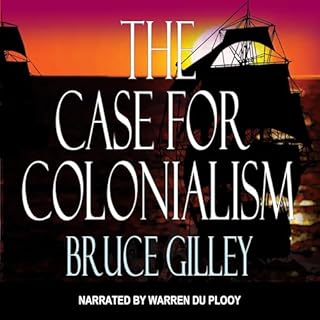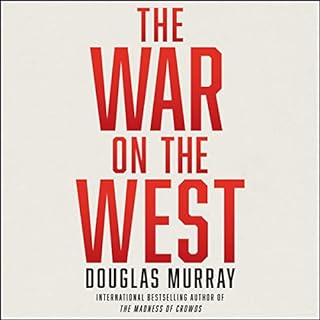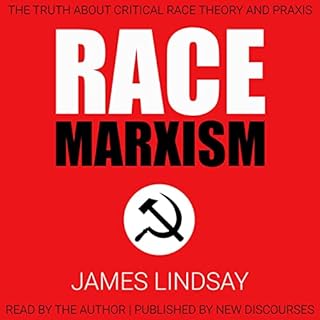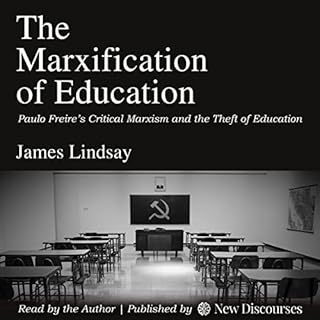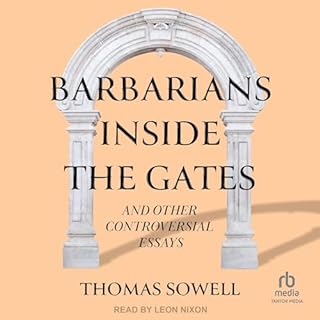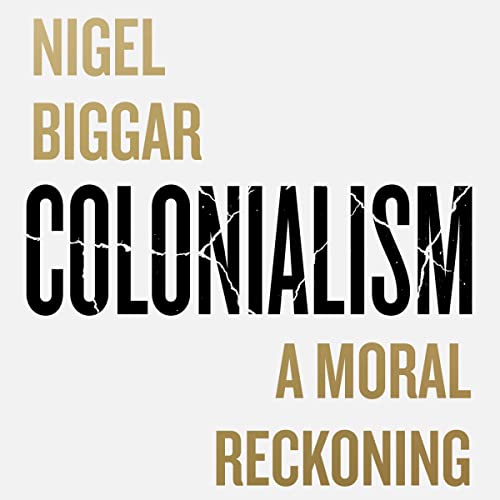
Colonialism
A Moral Reckoning
Failed to add items
Add to Cart failed.
Add to Wish List failed.
Remove from wish list failed.
Follow podcast failed
Unfollow podcast failed
Buy Now for $33.53
No default payment method selected.
We are sorry. We are not allowed to sell this product with the selected payment method
-
Narrated by:
-
Matt Bates
-
Written by:
-
Nigel Biggar
About this listen
The Sunday Times Bestseller
A new assessment of the West’s colonial record
In the wake of the dissolution of the Soviet empire in 1989, many believed that we had arrived at the ‘End of History’ – that the global dominance of liberal democracy had been secured forever.
Now however, with Russia rattling its sabre on the borders of Europe and China rising to challenge the post-1945 world order, the liberal West faces major threats.
These threats are not only external. Especially in the Anglosphere, the ‘decolonisation’ movement corrodes the West’s self-confidence by retelling the history of European and American colonial dominance as a litany of racism, exploitation, and massively murderous violence.
Nigel Biggar tests this indictment, addressing the crucial questions in eight chapters: Was the British Empire driven primarily by greed and the lust to dominate? Should we speak of ‘colonialism and slavery’ in the same breath, as if they were identical? Was the Empire essentially racist? How far was it based on the theft of land? Did it involve genocide? Was it driven fundamentally by the motive of economic exploitation? Was undemocratic colonial government necessarily illegitimate? and, Was the Empire essentially violent, and its violence pervasively racist and terroristic?
Biggar makes clear that, like any other long-standing state, the British Empire involved elements of injustice, sometimes appalling. On occasions it was culpably incompetent and presided over moments of dreadful tragedy.
Nevertheless, from the early 1800s the Empire was committed to abolishing the slave trade in the name of a Christian conviction of the basic equality of all human beings. It ended endemic inter-tribal warfare, opened local economies to the opportunities of global trade, moderated the impact of inescapable modernisation, established the rule of law and liberal institutions such as a free press, and spent itself in defeating the murderously racist Nazi and Japanese empires in the Second World War.
As encyclopaedic in historical breadth as it is penetrating in analytical depth, Colonialism offers a moral inquest into the colonial past, forensically contesting damaging falsehoods and thereby helping to rejuvenate faith in the West’s future.
PLEASE NOTE: When you purchase this title, the accompanying PDF will be available in your Audible Library along with the audio.
©2023 Nigel Biggar (P)2023 HarperCollins Publishers LimitedYou may also enjoy...
-
When Race Trumps Merit
- How the Pursuit of Equity Sacrifices Excellence, Destroys Beauty, and Threatens Lives
- Written by: Heather Mac Donald
- Narrated by: Olivia Lewis
- Length: 9 hrs and 46 mins
- Unabridged
-
Overall4.5 out of 5 stars 11
-
Performance5 out of 5 stars 8
-
Story5 out of 5 stars 8
Does your workplace have too few Black people in top jobs? It’s racist. Does the advanced math and science high school in your city have too many Asians? It’s racist. Does your local museum employ too many White women? It’s racist, too. After the Black Lives Matter protests of 2020, prestigious American institutions, from the medical profession to the fine arts, pleaded guilty to “systemic racism”.
-
5 out of 5 stars
-
interesting Book
- By Tara Siddall on 2023-05-14
Written by: Heather Mac Donald
-
Social Justice Fallacies
- Written by: Thomas Sowell
- Narrated by: Brad Sanders
- Length: 6 hrs and 9 mins
- Unabridged
-
Overall5 out of 5 stars 35
-
Performance5 out of 5 stars 26
-
Story5 out of 5 stars 26
The quest for social justice is a powerful crusade of our time, with an appeal to many different people, for many different reasons. But those who use the same words do not always present the same meanings. Clarifying those meanings is the first step toward finding out what we agree on and disagree on. From there, it is largely a question of what the facts are. Social Justice Fallacies reveals how many things that are thought to be true simply cannot stand up to documented facts, which are often the opposite of what is widely believed.
-
5 out of 5 stars
-
Well researched and much needed viewpoint.
- By Terry on 2023-10-02
Written by: Thomas Sowell
-
The New Puritans
- How the Religion of Social Justice Captured the Western World
- Written by: Andrew Doyle
- Narrated by: Andrew Doyle
- Length: 11 hrs and 28 mins
- Unabridged
-
Overall5 out of 5 stars 37
-
Performance5 out of 5 stars 32
-
Story5 out of 5 stars 32
Leading a cultural revolution driven by identity politics and so-called 'social justice', the new puritanism movement is best understood as a religion - one that makes grand claims to moral purity and tolerates no dissent. In The New Puritans, Andrew Doyle powerfully examines the underlying belief-systems of this ideology and how it has risen so rapidly to dominate all major political, cultural and corporate institutions. He reasons that, to move forward, we need to understand where these New Puritans came from and what they hope to achieve.
-
5 out of 5 stars
-
Examples of how history repeats are brilliant examples of how we can defeat nonsense again
- By Ina_M on 2024-07-15
Written by: Andrew Doyle
-
The Case for Colonialism
- Written by: Bruce Gilley
- Narrated by: Warren du Plooy
- Length: 10 hrs and 57 mins
- Unabridged
-
Overall5 out of 5 stars 1
-
Performance5 out of 5 stars 1
-
Story5 out of 5 stars 1
“For the last hundred years, Western colonialism has had a bad name.” So began Professor Bruce Gilley’s watershed academic article, “The Case for Colonialism,” of 2017. The article sparked a global furor. Critics and defenders of Gilley’s argument battled it out in the court of public opinion. The Times of London described Gilley as “probably the academic most likely to be no-platformed in Britain.” The New York Times called him one of the “panicky white bros” who “proclaim ever more rowdily that the (white) West was, and is, best” and are “busy recyclers of Western supremacism.”
Written by: Bruce Gilley
-
America's Cultural Revolution
- How the Radical Left Conquered Everything
- Written by: Christopher F. Rufo
- Narrated by: Charles Constant
- Length: 11 hrs and 23 mins
- Unabridged
-
Overall5 out of 5 stars 11
-
Performance4.5 out of 5 stars 10
-
Story5 out of 5 stars 10
In the 1960s, Mao launched China’s Cultural Revolution. Cities grew overcrowded. Technocrats demanded progress from above. Anyone opposed was sent to be “re-educated.” China’s revolution was bloody, fast, and a failure, but what if America started a revolution at the same time, based on the same bad ideas, and it’s just been slower, calmer, and more effective?
-
5 out of 5 stars
-
Vital information
- By A.B. on 2024-02-13
Written by: Christopher F. Rufo
-
The Identity Trap
- A Story of Ideas and Power in Our Time
- Written by: Yascha Mounk
- Narrated by: JD Jackson
- Length: 11 hrs and 1 min
- Unabridged
-
Overall5 out of 5 stars 20
-
Performance4.5 out of 5 stars 16
-
Story5 out of 5 stars 16
For much of history, societies have violently oppressed ethnic, religious, and sexual minorities. It is no surprise that many who passionately believe in social justice came to believe that members of marginalized groups need to take pride in their identity to resist injustice.
-
5 out of 5 stars
-
Absolutely On The Button
- By Nick on 2023-11-23
Written by: Yascha Mounk
-
When Race Trumps Merit
- How the Pursuit of Equity Sacrifices Excellence, Destroys Beauty, and Threatens Lives
- Written by: Heather Mac Donald
- Narrated by: Olivia Lewis
- Length: 9 hrs and 46 mins
- Unabridged
-
Overall4.5 out of 5 stars 11
-
Performance5 out of 5 stars 8
-
Story5 out of 5 stars 8
Does your workplace have too few Black people in top jobs? It’s racist. Does the advanced math and science high school in your city have too many Asians? It’s racist. Does your local museum employ too many White women? It’s racist, too. After the Black Lives Matter protests of 2020, prestigious American institutions, from the medical profession to the fine arts, pleaded guilty to “systemic racism”.
-
5 out of 5 stars
-
interesting Book
- By Tara Siddall on 2023-05-14
Written by: Heather Mac Donald
-
Social Justice Fallacies
- Written by: Thomas Sowell
- Narrated by: Brad Sanders
- Length: 6 hrs and 9 mins
- Unabridged
-
Overall5 out of 5 stars 35
-
Performance5 out of 5 stars 26
-
Story5 out of 5 stars 26
The quest for social justice is a powerful crusade of our time, with an appeal to many different people, for many different reasons. But those who use the same words do not always present the same meanings. Clarifying those meanings is the first step toward finding out what we agree on and disagree on. From there, it is largely a question of what the facts are. Social Justice Fallacies reveals how many things that are thought to be true simply cannot stand up to documented facts, which are often the opposite of what is widely believed.
-
5 out of 5 stars
-
Well researched and much needed viewpoint.
- By Terry on 2023-10-02
Written by: Thomas Sowell
-
The New Puritans
- How the Religion of Social Justice Captured the Western World
- Written by: Andrew Doyle
- Narrated by: Andrew Doyle
- Length: 11 hrs and 28 mins
- Unabridged
-
Overall5 out of 5 stars 37
-
Performance5 out of 5 stars 32
-
Story5 out of 5 stars 32
Leading a cultural revolution driven by identity politics and so-called 'social justice', the new puritanism movement is best understood as a religion - one that makes grand claims to moral purity and tolerates no dissent. In The New Puritans, Andrew Doyle powerfully examines the underlying belief-systems of this ideology and how it has risen so rapidly to dominate all major political, cultural and corporate institutions. He reasons that, to move forward, we need to understand where these New Puritans came from and what they hope to achieve.
-
5 out of 5 stars
-
Examples of how history repeats are brilliant examples of how we can defeat nonsense again
- By Ina_M on 2024-07-15
Written by: Andrew Doyle
-
The Case for Colonialism
- Written by: Bruce Gilley
- Narrated by: Warren du Plooy
- Length: 10 hrs and 57 mins
- Unabridged
-
Overall5 out of 5 stars 1
-
Performance5 out of 5 stars 1
-
Story5 out of 5 stars 1
“For the last hundred years, Western colonialism has had a bad name.” So began Professor Bruce Gilley’s watershed academic article, “The Case for Colonialism,” of 2017. The article sparked a global furor. Critics and defenders of Gilley’s argument battled it out in the court of public opinion. The Times of London described Gilley as “probably the academic most likely to be no-platformed in Britain.” The New York Times called him one of the “panicky white bros” who “proclaim ever more rowdily that the (white) West was, and is, best” and are “busy recyclers of Western supremacism.”
Written by: Bruce Gilley
-
America's Cultural Revolution
- How the Radical Left Conquered Everything
- Written by: Christopher F. Rufo
- Narrated by: Charles Constant
- Length: 11 hrs and 23 mins
- Unabridged
-
Overall5 out of 5 stars 11
-
Performance4.5 out of 5 stars 10
-
Story5 out of 5 stars 10
In the 1960s, Mao launched China’s Cultural Revolution. Cities grew overcrowded. Technocrats demanded progress from above. Anyone opposed was sent to be “re-educated.” China’s revolution was bloody, fast, and a failure, but what if America started a revolution at the same time, based on the same bad ideas, and it’s just been slower, calmer, and more effective?
-
5 out of 5 stars
-
Vital information
- By A.B. on 2024-02-13
Written by: Christopher F. Rufo
-
The Identity Trap
- A Story of Ideas and Power in Our Time
- Written by: Yascha Mounk
- Narrated by: JD Jackson
- Length: 11 hrs and 1 min
- Unabridged
-
Overall5 out of 5 stars 20
-
Performance4.5 out of 5 stars 16
-
Story5 out of 5 stars 16
For much of history, societies have violently oppressed ethnic, religious, and sexual minorities. It is no surprise that many who passionately believe in social justice came to believe that members of marginalized groups need to take pride in their identity to resist injustice.
-
5 out of 5 stars
-
Absolutely On The Button
- By Nick on 2023-11-23
Written by: Yascha Mounk
-
The War on the West
- Written by: Douglas Murray
- Narrated by: Douglas Murray
- Length: 12 hrs and 42 mins
- Unabridged
-
Overall5 out of 5 stars 617
-
Performance5 out of 5 stars 546
-
Story5 out of 5 stars 541
In The War on the West, Douglas Murray shows how many well-meaning people have been fooled by hypocritical and inconsistent anti-West rhetoric. After all, if we must discard the ideas of Kant, Hume, and Mill for their opinions on race, shouldn’t we discard Marx, whose work is peppered with racial slurs and anti-Semitism? Embers of racism remain to be stamped out in America, but what about the raging racist inferno in the Middle East and Asia?
-
5 out of 5 stars
-
One of the best audiobooks I've ever purchased
- By Mark on 2022-05-13
Written by: Douglas Murray
-
Race Marxism
- The Truth About Critical Race Theory and Praxis
- Written by: James Lindsay
- Narrated by: James Lindsay
- Length: 12 hrs and 43 mins
- Unabridged
-
Overall5 out of 5 stars 20
-
Performance4.5 out of 5 stars 19
-
Story5 out of 5 stars 19
Critical race theory is one of the hottest and most controversial topics in the world today, but what is it, really? Rightly understood, critical race theory is a reinvention of an older, terrible idea, Marxism, using race "as the central construct for understanding inequality" in place of economic class. That is, critical race theory is race Marxism. The evidence of this claim is so overwhelming upon even casual examination that it is a shock that it isn't immediately plain to everyone who encounters it.
-
2 out of 5 stars
-
A pretentious explanation of a complex issue
- By Gerry Corcoran on 2022-08-15
Written by: James Lindsay
-
Feminism Against Progress
- Written by: Mary Harrington
- Narrated by: Mary Harrington
- Length: 6 hrs and 30 mins
- Unabridged
-
Overall5 out of 5 stars 7
-
Performance4 out of 5 stars 6
-
Story5 out of 5 stars 6
In Feminism Against Progress, Mary Harrington argues that the industrial-era faith in progress is turning against all but a tiny elite of women. Women's liberation was less the result of human moral progress than an effect of the material consequences of the Industrial Revolution.
-
5 out of 5 stars
-
Historical data was spot on
- By Reene Beaudoin on 2023-12-11
Written by: Mary Harrington
-
In Defense of German Colonialism
- And How Its Critics Empowered Nazis, Communists, and the Enemies of the West
- Written by: Bruce Gilley
- Narrated by: Damon Abernathy
- Length: 7 hrs and 48 mins
- Unabridged
-
Overall0 out of 5 stars 0
-
Performance0 out of 5 stars 0
-
Story0 out of 5 stars 0
Famed historian, university professor, and author of the groundbreaking "The Case for Colonialism" Bruce Gilley demonstrates that, contrary to modern presuppositions, German colonialism from its early roots to the mid-twentieth century served overall as a global force for good in the world, elevating the lives of its subjects and encouraging scientific development while allowing native cultures to flourish within its governance.
Written by: Bruce Gilley
-
The Marxification of Education
- Paulo Freire's Critical Marxism and the Theft of Education
- Written by: James Lindsay
- Narrated by: James Lindsay
- Length: 7 hrs and 15 mins
- Unabridged
-
Overall4.5 out of 5 stars 10
-
Performance5 out of 5 stars 8
-
Story5 out of 5 stars 8
Education is in bad shape in America and beyond today. It’s obvious. Everyone perceives it. Something is going badly wrong in our schools. Our children aren’t learning as they should be. Their mastery of core academic curriculum like reading, writing, history, mathematics, science, and civics has declined to crisis levels and shows no signs of improvement. Meanwhile, they’re all learning to be activists, turning their backs on their nations, societies, and even their parents and religions.
-
4 out of 5 stars
-
a helpful book
- By Ben Vaughan on 2024-02-07
Written by: James Lindsay
-
The White Pill
- A Tale of Good and Evil
- Written by: Michael Malice
- Narrated by: Michael Malice
- Length: 9 hrs and 11 mins
- Unabridged
-
Overall4.5 out of 5 stars 86
-
Performance4.5 out of 5 stars 76
-
Story5 out of 5 stars 75
The Bolsheviks promised that they were building a new society, a workers’ paradise that would change the nature of mankind itself. What they ended up constructing was the largest prison the world had ever seen: a Union of Soviet Socialist Republics that spanned half the globe.
-
5 out of 5 stars
-
Untold history
- By CM on 2023-04-21
Written by: Michael Malice
-
The Canceling of the American Mind
- Cancel Culture Undermines Trust, Destroys Institutions, and Threatens Us All—but There Is a Solution
- Written by: Greg Lukianoff, Rikki Schlott
- Narrated by: Rikki Schlott, Kirby Heyborne
- Length: 7 hrs and 30 mins
- Unabridged
-
Overall4.5 out of 5 stars 11
-
Performance4 out of 5 stars 10
-
Story4.5 out of 5 stars 9
Cancel culture is a new phenomenon, and The Canceling of the American Mind is the first book to codify it and survey its effects, including hard data and research on what cancel culture is and how it works, along with hundreds of new examples showing the left and right both working to silence their enemies.
-
5 out of 5 stars
-
A must read to understand the current zeitgeist
- By Amazon Customer on 2023-12-06
Written by: Greg Lukianoff, and others
-
Stolen Youth
- How Radicals Are Erasing Innocence and Indoctrinating a Generation
- Written by: Karol Markowicz, Bethany Mandel
- Narrated by: Maggie Richardson
- Length: 9 hrs and 5 mins
- Unabridged
-
Overall5 out of 5 stars 10
-
Performance5 out of 5 stars 10
-
Story5 out of 5 stars 10
The left is waging an all-out battle on the American family, particularly the youngest members. If they can make our children miserable, lead them to question every building block of society, and rebuild their entire concept of reality, then the left and their woke indoctrinators will consider that a victory. But we can't let them win. As concerned parents and American citizens, we have to understand what's truly going on before we can do something about it. Stolen Youth provides an urgent deep dive into issues surrounding the current woke indoctrination happening.
-
5 out of 5 stars
-
Excellent book
- By David on 2023-06-05
Written by: Karol Markowicz, and others
-
Mao's America
- A Survivor's Warning
- Written by: Xi Van Fleet
- Narrated by: Ava Wong, Xi Van Fleet, James Lindsay
- Length: 8 hrs and 56 mins
- Unabridged
-
Overall5 out of 5 stars 10
-
Performance5 out of 5 stars 9
-
Story5 out of 5 stars 9
Xi Van Fleet lived through the horrors of the Chinese Cultural Revolution as a schoolgirl. Forced to the countryside with other young Chinese for re-education after high school, she later escaped communism and found freedom and new a life in America. But more than 30 years later, Xi disturbingly sees signs of the same Cultural Marxism that ravaged her birth country of China threatening to destroy the America she now calls home.
-
5 out of 5 stars
-
so well written
- By LLB on 2024-05-24
Written by: Xi Van Fleet
-
An Immigrant's Love Letter to the West
- Written by: Konstantin Kisin, Peter Lloyd
- Narrated by: Konstantin Kisin
- Length: 5 hrs and 29 mins
- Unabridged
-
Overall5 out of 5 stars 63
-
Performance5 out of 5 stars 56
-
Story5 out of 5 stars 56
For all of the West's failings—terrible food, cold weather and questionable politicians with funny hair to name a few—it has its upsides. Konstantin would know. Growing up in the Soviet Union, he experienced first-hand the horrors of a socialist paradise gone wrong, having lived in extreme poverty with little access to even the most basic of necessities. It wasn't until he moved to the UK that Kisin found himself thriving in an open and tolerant society, receiving countless opportunities he would never have had otherwise.
-
5 out of 5 stars
-
99% of what you said is sound
- By Alex Chapman on 2023-02-22
Written by: Konstantin Kisin, and others
-
Lies My Liberal Teacher Told Me
- Debunking the False Narratives Defining America’s School Curricula
- Written by: Wilfred Reilly
- Narrated by: Mirron Willis
- Length: 9 hrs and 28 mins
- Unabridged
-
Overall5 out of 5 stars 4
-
Performance5 out of 5 stars 2
-
Story5 out of 5 stars 2
In 1995, James W. Loewen penned the classic work of criticism Lies My Teacher Told Me, a left-leaning corrective that addressed much of what was sanitized and omitted from American history books. But in the decades that followed, false leftist narratives—as wrong as those they supplanted—have come to dominate American academia and education. Now, in the same spirit but updated for 2024, Wilfred Reilly demolishes the scholastic myths propagated by the left, uncovers fresh angles on “established” events, and turns what we think we know about history upside down.
Written by: Wilfred Reilly
-
Barbarians Inside the Gates and Other Controversial Essays
- Written by: Thomas Sowell
- Narrated by: Leon Nixon
- Length: 8 hrs and 40 mins
- Unabridged
-
Overall3.5 out of 5 stars 3
-
Performance3 out of 5 stars 2
-
Story3 out of 5 stars 2
A collection of essays that discusses such issues as the media, immigration, the minimum wage, and multiculturalism.
-
1 out of 5 stars
-
An echo in the echo chamber
- By Theo Kolivakis on 2024-02-06
Written by: Thomas Sowell
What the critics say
‘A fascinating read, informative, surprising and written with panache and clarity’ The Times, Andrew Billen
‘A thoughtful, compelling text’ Daily Telegraph, five-star review
‘A salutary corrective’ The Times, Book of the Week
‘Carries the intellectual force of a Javeline antitank missile. Colonialism is no apologia for empire… but calls for balance…Biggar acknowledges wickedness in our nation but his version of history calls us to accept the messiness and moral compromises inherent in liberalism’ Sunday Times
‘Nigel Biggar has written … the book on the morality of the British Empire, a kind of Encyclopaedia Pacis Britannicae…. a thoughtful, compelling text’ Sunday Telegraph
‘An important, timely and brave book…the first serious counter blast against the hysterical and ahistorical orthodoxy that has placed such a stranglehold on our public discourse on the British Empire, and as such will prove to be an indispensable handbook in the battles to come. It is also exceedingly well written and compellingly argued’ The Critic
‘An important book, as well as a courageous one’ Literary Review
‘Patiently argued and carefully balanced yet passionately committed to the production of a narrative which replaces denunciation and with evidences and understanding’ Quillette
‘Biggar fearlessly goes where few other scholars now venture to tread: to defend the British empire against its increasingly vitriolic detractors … Those who wish to accuse the Victorians of genocide – who seek gulags in Kenya or Holocausts in the Raj – will probably not risk being ‘triggered’ by reading this book. But they really should … Biggar’s book simply cannot be ignored by anyone who wishes to hold a view on the subject’
Niall Ferguson, Milbank Family Senior Fellow, Hoover Institution, Stanford University, and author of Empire: How Britain Made the Modern World
What listeners say about Colonialism
Average Customer RatingsReviews - Please select the tabs below to change the source of reviews.
-
Overall5 out of 5 stars
-
Performance5 out of 5 stars
-
Story5 out of 5 stars
- Mark S
- 2023-03-15
A mostly balanced perspective
The author is clearly unshambed of western civilization. His motivation is to balance current condemnation of historic colonialism with perspective and as much unbiased fact as possible.
You do not need to pick sides in order to benefit from listening to this audio book. In fact, picking a side at all is probably a failure to appreciate the scope and infinite complexity of all the human factors at play.
The British Empire was not perfect. But it is worth asking if an alternative would or could have been any better.
I suppose my personal bias is that I appreciate the benefits of modern civilization and acknowledge the challenges of human nature and the limitations of government to create utopia.
Not perfect, but could be worse.
Life before modern civilization was solitary, poor, nasty, brutish and short.
Something went wrong. Please try again in a few minutes.
You voted on this review!
You reported this review!
-
Overall5 out of 5 stars
-
Performance5 out of 5 stars
-
Story5 out of 5 stars
- jacob roy
- 2023-06-14
A Centrist's Point of View
Many years ago, books that discussed colonialism could often be triumphant and even bigoted in character. More recently it seems most books were purely critical. In Colonialism A Moral Reckoning, Biggar, attempts, rather successfully, to find a balance. Colonialism is a part of human history and it is has both benefited and impeded the people involved in it.
Something went wrong. Please try again in a few minutes.
You voted on this review!
You reported this review!
-
Overall5 out of 5 stars
-
Performance5 out of 5 stars
-
Story5 out of 5 stars
- Hareishun S
- 2023-10-07
Nuanced, scholarly, and an excellent review of the issue.
Puts to shame the ideologically possessed Academics at the Ivy League, and Oxbridge.
Unlike them, the Author reviews the events, intentions, and outcomes of what occurred during British Colonialism, and gives both praise and condemnation, when it’s due.
Something went wrong. Please try again in a few minutes.
You voted on this review!
You reported this review!





